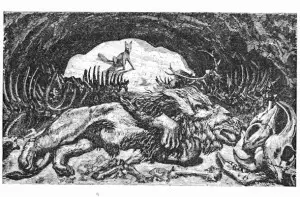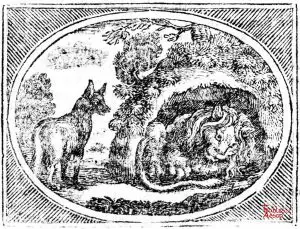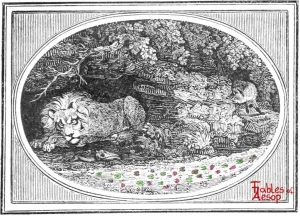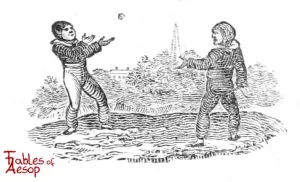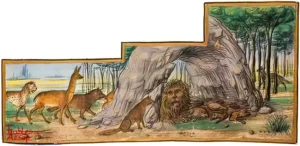A sick lion called others to his cave. Many went in but none came out. Latecomers refused to go in. Smart!
The wise learn from misfortunes of others.

Aesop For Children (The Old Lion and The Fox)
An old Lion, whose teeth and claws were so worn that it was not so easy for him to get food as in his younger days, pretended that he was sick. He took care to let all his neighbors know about it, and then lay down in his cave to wait for visitors. And when they came to offer him their sympathy, he ate them up one by one.
The Fox came too, but he was very cautious about it. Standing at a safe distance from the cave, he inquired politely after the Lion’s health. The Lion replied that he was very ill indeed, and asked the Fox to step in for a moment. But Master Fox very wisely stayed outside, thanking the Lion very kindly for the invitation.
“I should be glad to do as you ask,” he added, “but I have noticed that there are many footprints leading into your cave and none coming out. Pray tell me, how do your visitors find their way out again?”
Moral
Take warning from the misfortunes of others.

Eliot/Jacobs Version
The Lion once announced he was sick and summoned the animals to come and hear his last Will and Testament. The Goat came to the Lion’s cave, stopped there and listened for a long time. Then a Sheep went in, and before she came out a Calf came up to receive the last wishes of the King of the Beasts.
Soon the Lion seemed to recover, and came to the mouth of his cave. He saw the Fox, who had been waiting outside for some time.
“Why do you not come to pay your respects to me?” said the Lion to the Fox.
“I beg your Majesty’s pardon,” said the Fox, “but I noticed the track of the animals that have already come to you; and while I see many hoof-marks going in, I see none coming out. Until the animals that have entered your cave come out again I prefer to remain in the open air.”

JBR Collection
It was reported that the Lion was sick and confined to his den, where he would be happy to see any of his subjects who might come to pay the homage that was due to him. Many accordingly went in, but it was observed that the Fox very carefully kept away. The Lion noticed his absence, and sent one of his Jackals to express a hope that he would show he was not insensible to motives of respect and charity, by coming and paying his duty like the rest. The Fox told the Jackal to offer his sincerest reverence to his master, and to say that he had more than once been on the point of coming to sec him, but he had in truth observed that all the foot-prints at the mouth of the cave pointed inwards, and none outwards, and not being able to explain that fact to his satisfaction, he had taken the liberty of stopping away. The truth was that this illness of the Lion’s was only a sham to induce the beasts to come to his den, that he might the more easily devour them.

Townsend version (The Sick Lion)
A lion, unable from old age and infirmities to provide himself with food by force, resolved to do so by artifice. He returned to his den, and lying down there, pretended to be sick, taking care that his sickness should be publicly known. The beasts expressed their sorrow, and came one by one to his den, where the Lion devoured them. After many of the beasts had thus disappeared, the Fox discovered the trick and presenting himself to the Lion, stood on the outside of the cave, at a respectful distance, and asked him how he was. “I am very middling,” replied the Lion, “but why do you stand without? Pray enter within to talk with me.” “No, thank you,” said the Fox. “I notice that there are many prints of feet entering your cave, but I see no trace of any returning.”
Moral
He is wise who is warned by the misfortunes of others.

Samuel Croxall
IT was reported that the Lion was sick, and the beasts were made to believe that they could not make their court better, than by going to visit him. Upou this, they generally went; but it was particularly taken notice of, that the Fox was not one of the number. The Lion therefore dispatched one of his Jackalls to sound him about it, and ask him why he had so little charity and respect as never to come near him at a time when he lay so dangerously ill, and every body else had been to see him. Why, replies the Fox, pray, present my duty to his majesty, and tell him that I have the same respect for him as ever, and have been coming several times to kiss his royal hand; but! am so terribly frightened at the mouth of his cave, to see the print of my fellow subjects feet, all pointing forwards, and none back wards, that I have not resolution enough to venture in. Now, the truth of the matter was, that the sickness of the Lion was only a sham to draw the beasts into his den, the more easily to devour them.
THE APPLICATION
A man should weigh and consider the nature of any proposal well, before he gives into it: for a rash and hasty compliance has been the ruin of many a one. And it is the quintessence of prudence not to be too easy of belief. Indeed the multitude think altogether in the same track, and are much upon a foot. Their meditations are confined in one channel, and they follow one another very orderly in a regular stupidity. Can a man of thought and spirit be harnessed thus, and trudge along like a pack-horse, in a deep stinking muddy road, when he may frisk it over the beauteous lawns, or lose himself agreeably in the shady, verdant mazes of unrestrained contemplation? It is impossible. Vulgar notions are so generally attended with error, that wherever one traces the footsteps of the many tending all one way, it is enough to make one suspect, with the Fox in the fable, that there is some trick in it. The eye of reason is dulled and stupified when it is confined, and made to gaze continually upon the same thing: it rather chuses to look about it, and amuse itself with variety of objects, as they lie scattered up and down in the unbounded prospect. He that goes implicitly upon a thing may be mistaken, notwithstanding the number of those who keep him company; but he that keeps out till he sees reason to enter, acts upon true maxims of policy and prudence. In short, it becomes us, as we are reasonable creatures, to behave ourselves as such, and to do as few things as possible, of which we may have occasion to repent.

Thomas Bewick (The Fox and The Sick Lion)
It was reported that the Lion was sick, and the beasts were given to understand that they could not make their court better than by going to visit him. Upon this they generally went; but it was particularly taken notice of, that the Fox was not one of the number. The Lion therefore dispatched one of his Jackalls to enquire why he had so little charity and respect as never to come near him, at a time when he lay so dangerously ill, and every body else had been to see him? Why, replies the Fox, pray present my duty to his majesty, and tell him that I have the same respect for him as ever, and have been coming several times, but was fearful of being troublesome, as I have observed, from the prints of their footsteps, that great numbers have gone into the royal den; but I have not seen a single trace of their coming out again.
APPLICATION.
He that embarks implicitly in any scheme, may be mistaken, notwithstanding the number who keep him company; but he that keeps out till he sees reason to enter, acts upon true maxims of policy; and it is the quintessence of prudence not to be too easy of belief: for a rash and hasty credulity has been the ruin of many. Men who habituate themselves to think, will profit by the experience of others, as well as their own: but commonly the multitude do not reason, but stupidly follow each other step by step; not moving out of the sphere in which chance has placed them: and the notions or prejudices they may have imbibed in youth, remain with them to the last. There is no opinion, however impious or absurd, that has not its advocates in some quarter of the world. Whoever, therefore, takes up his creed upon trust, and grounds his principles on no better reason than his being a native or inhabitant of the regions wherein they prevail, becomes a disciple of Mahomet in Turkey, and of Confucius in China; a Jew, or a Pagan, as the accident of birth decides.

L’Estrange version
A certain lyon that had got a politique fit of sickness, made it his observation, that of all the beasts in the forrest, the fox never came at him: and so he wrote him word how ill he was, and how mighty glad he should be of his company, upon the score of ancient friendship and acquaintance. The fox return’d the complement with a thousand prayers for his recovery; but as for waiting upon him, he desir’d to be excus’d; for (says he) I find the traces of abundance of feet going in to your majesties palace, and not one that comes back again.
Moral
The kindnesses of ill natur’d and designing people, should be thoroughly consider’d, and examin’d, before we give credit to them.

Crane Poetry Visual (The Ass and The Sick Lion)
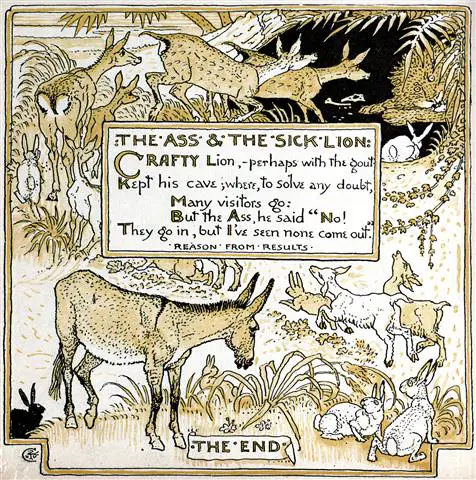
Crafty Lion, perhaps with the gout
Kept his cave; where, to solve any doubt,
Many visitor go:
But the Ass, he said “No!
They go in, but I’ve seen none come out.”
Reason from results.

Gherardo Image from 1480

Leo Senex et Vulpes
Leo, defectus annis, recubabat in spelunca sua et aegrum simulabat. Visitatum regem complures venerunt bestiae, quas protinus devoravit. Accessit etiam vulpes, sed cauta ante speluncam procul stabat, salutans regem. “Cur non intras?” interrogavit leo. Vulpes respondit, “Quod video vestigia intrantium multa, at nulla exeuntium.”
Perry #142

